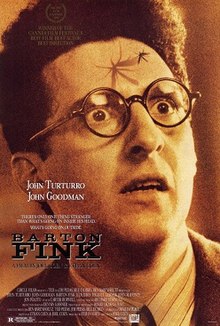Barton Fink
| Barton Fink | |
|---|---|

Theatrical release poster
|
|
| Directed by | Joel Coen |
| Produced by | Ethan Coen |
| Written by | Ethan Coen Joel Coen |
| Starring | |
| Music by | Carter Burwell |
| Cinematography | Roger Deakins |
| Edited by | Roderick Jaynes |
|
Production
company |
Circle Films
Working Title Films |
| Distributed by |
20th Century Fox (US) Universal Pictures (UK) |
|
Release date
|
|
|
Running time
|
117 minutes |
| Country | United States |
| Language | English |
| Budget | $9 million |
| Box office | $6.2 million |
Barton Fink is a 1991 American period film written, produced, directed and edited by the Coen brothers. Set in 1941, it stars John Turturro in the title role as a young New York City playwright who is hired to write scripts for a film studio in Hollywood, and John Goodman as Charlie, the insurance salesman who lives next door at the run-down Hotel Earle.
The Coens wrote the screenplay for Barton Fink in three weeks while experiencing difficulty during the writing of Miller's Crossing. They began filming the former soon after Miller's Crossing was finished. The film is influenced by works of several earlier directors, particularly Roman Polanski's Repulsion (1965) and The Tenant (1976).
Barton Fink had its premiere at the Cannes Film Festival in May 1991. In a rare sweep, it won the Palme d'Or, as well as awards for Best Director and Best Actor (Turturro). Although the film was a box office bomb, only grossing $6 million against its $9 million budget, it received positive reviews and was nominated for three Academy Awards. Prominent themes of Barton Fink include the writing process; slavery and conditions of labor in creative industries; superficial distinctions between high culture and low culture; and the relationship of intellectuals with "the common man".
The diverse elements of the film have led it to defy efforts at genre classification, with the work being variously referred to as a film noir, a horror film, a Künstlerroman, and a buddy film. It contains various literary allusions and religious overtones, as well as references to many real-life people and events – most notably the writers Clifford Odets and William Faulkner, of whom the characters of Barton Fink and W. P. Mayhew are often seen as fictional representations. Several features of the film's narrative, particularly an image of a woman at the beach which recurs throughout, have sparked much commentary, with the Coens acknowledging some intentional symbolic elements while denying an attempt to communicate any single message in the film. Despite disagreement around certain details of the work, Barton Fink continues to be positively received, with screenwriter Charlie Kaufman among its admirers.
...
Wikipedia
